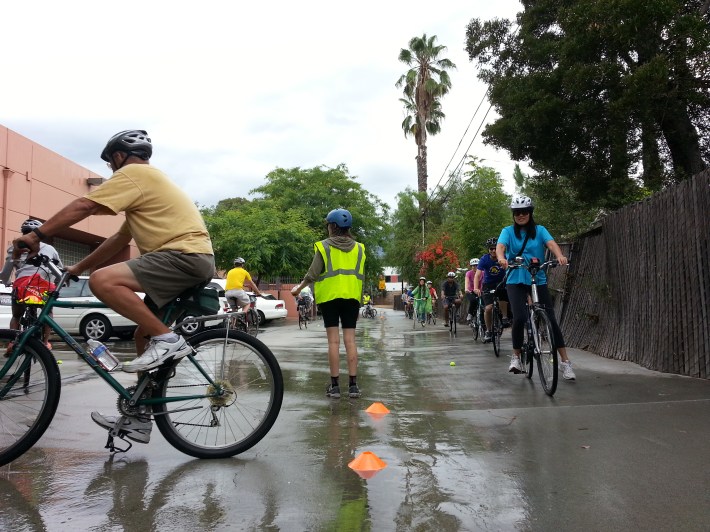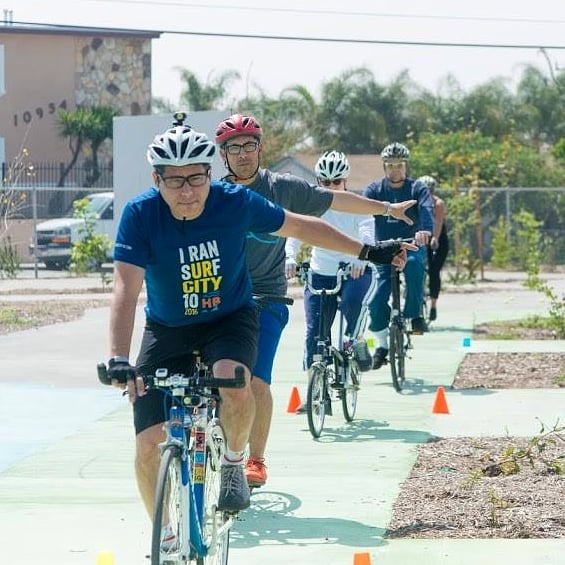One of the ways the state of California hopes to meet its greenhouse gas emission reduction goals is by replacing gas-powered cars with electric vehicles. To that end, the California Air Resources Board has created several programs, funded by cap-and-trade, to help state residents buy electric cars. But—so far—the state has not offered any help to people who want to purchase electric bikes.
People tend to dismiss the idea as inconsequential, but electric bikes could help people replace many of their short car trips—and most trips in California are under three miles, a distance easily covered by an e-bike. Shifting those trips to bikes has added benefits that you can't get with electric cars, as well, including reducing congestion and helping people get some healthy outdoor activity.
Bike San Gabriel Valley could see the potential of e-bikes, and knew that many people in its community would have trouble coming up with the money for an electric bike. “We support the adoption of e-bikes, especially given that rebates are being thrown at cars,” said Wesley Reutimann, Executive Director of BikeSGV. “They have good utility, and with our topography and the more and more hot days that we are experiencing, they make sense.”
So BikeSGV, instead of waiting for state action, created its own rebate program. When it is complete, the pilot program will have helped community members buy 100 electric bikes—everything from folding to cargo bikes. Most of the bikes purchased through the program are electric assist bikes, without a 'throttle' option, which require pedaling and just add a boost when needed.
Working with the City of El Monte, BikeSGV had applied for funds raised by new toll lanes on the I-10 freeway. By law, the revenue from those tolls must be reinvested along the corridor, and forty percent is earmarked for active transportation.
The city and BikeSGV received $70,000 for the e-bike rebates, as part of a healthy communities program that included other components, such as cycling classes and bike fix-it stations. At first, they planned to offer $350 rebates, but there wasn't very much response. Electric bikes run anywhere from $700 for the cheapest models to over $2,000, a lot of money for people who don't have much. BikeSGV got permission to double the amount of the rebate to $700, which allowed them to offer 100 rebates.

To be eligible for a rebate, applicants had to take one of BikeSGV's standard City Cycling classes (a free three-hour class that incorporates in-class discussions and on-bike skills practice) and live within three miles of the express lanes on the I-10 corridor. The area encompasses about ten cities, and much of the community is low-income and heavily burdened by pollution from local sources as well as the freeways themselves.
The pilot program officially ended on December 31, and BikeSGV is in the process of winding down the paperwork on the last rebates. There is a waiting list of interested e-bike buyers hoping the program will be extended.
“We will be doing follow-up evaluation of the impacts of the program,” said Reutimann. “We'll ask about use patterns, to see whether the bikes are affecting short car trips. We ask about how people are using bikes, and what their perceptions of safety are before and after taking the class.”
“We also want to know about what barriers there are for people using them. We'll ask about their primary mode of transportation. We want to know if people are using the bikes for transportation or recreation, or both.”
Of course, this is useful information and can help with ongoing statewide advocacy efforts to add e-bikes to the list of electric vehicles eligible for rebates. The more data there is, the stronger the argument in favor of adding bikes.
But why are we even having this argument? There's no similar standard for electric car rebates. The Air Resources Board doesn't question the purpose of trips made in new electric vehicles, so why is that an important question for e-bikes? Any bike trip is one less car trip, and if electric bikes make it possible for more people to get on bikes, why wouldn't the state want to support that?
It's easy to make the case that supporting more bike trips will help California's climate goals, and at the same time reduce congestion, which all the electric cars and road building in the world will not achieve.
It's a matter of investment priorities. California is very much a car-dependent state, and it is planning to remain one.






